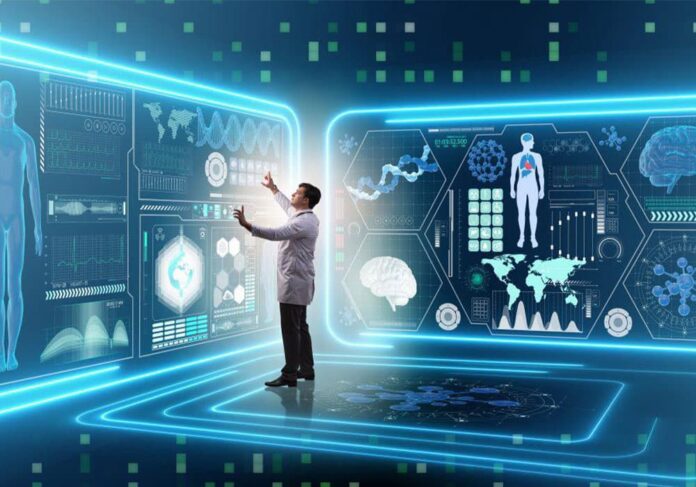AI in Healthcare, The term “artificial intelligence” is on everyone’s lips, and it is almost difficult to browse a website or read a magazine without encountering this term, and it has become the subject of public chat sessions.
Artificial intelligence is the new popular term that everyone is trying to understand and put to good use. And in sectors like education, the aerospace industry, the financial sector, defense, or whatever sector we’re talking about, AI can play a role.
The healthcare sector is not an exception; The past few years have witnessed a huge spread of artificial intelligence applications in the medical field.
But What Exactly is Artificial Intelligence?
Since when do we think about it? The answer to the last question: a long time ago; Where examples began to appear in science fiction literature, and films that introduced us to the concept of robots capable of behaving like humans with a tinge of emotions, a traditional human trait.
The meaning of the concept represented by artificial intelligence has changed with the development of science and technology.
In its simplest terms, we can say that artificial intelligence is “when a certain machine behaves like humans when it can solve a specific problem when it learns.”
Artificial intelligence has been in the healthcare field for decades; In the 1960s, attempts were made to use computing devices to determine the best antibiotics for bacterial infections, as well as in organic chemistry.
However, the amount of effort that these attempts required in the early stages made it useless and impractical. It was not worth the time allotted to it, and it lacked the quick response needed when treating patients.
The technological development that began in the eighties of the last century has changed the shape of opportunities; Computers that used to fill an entire room can now be on your desk, and we’re also beginning to use the Internet, along with the Human Genome Project.
Electronic medical records such as EPIC and CERNER have made data mining and treatment studies much easier, making paper charts with handwritten notes a thing of the past. This made the available healthcare data increase exponentially.
Nowadays, AI is achieving amazing things in the healthcare sector. Many of these initiatives are due to joint ventures between the medical sector and major technology companies such as IBM and Google.

For example, IBM Watson is famous for appearing on the American quiz show Jeopardy! (The Touchstone) and defeating human heroes, but it is also used at Cleveland Clinic in Ohio to help teach medical students about pathophysiology and diagnosis.
DeepMind can beat you at chess, but it’s also being used today to help improve mammography and early detection of breast cancer. The Apple Watch is not only used to send text messages, but it is also used to monitor the heartbeat of patients with arrhythmia, and also to send this data to their doctors so that they can make adjustments to treatment.
Despite the impressive advances that AI can bring to medicine, there are potential flaws, and we need to be aware of them before we rush forward recklessly. There are questions that should be asked, and at least thought about, if not answered, including:
How will artificial intelligence affect the healthcare workforce?
And can doctors within pattern-based disciplines — such as anatomical pathology and radiology — be replaced by AI systems?
There are studies done by Stanford University and Google’s DeepMind company that compare results. This does not mean that workforce changes are the end of the world, but they must be taken into account.
What about ethical issues? Can computers understand the gray areas behind transplantation and decisions to withdraw care? Will the human biases of computer programmers be transferred to the machines they create?
AI in Healthcare and Confidentiality of Data
Confidentiality must also be redefined; If a patient tells me about a sensitive part of his medical history and asks me not to put it in his medical record, I may respect that request, but I will continue to treat that patient appropriately as a result of the self-knowledge I have formed. Whereas a computer cannot do this.
AI in Healthcare, Who is the Accountable?
Also what about accountability? If a computer makes a mistake that harms a patient, who is responsible? Is it the company that manufactured it? Or is it the technician who turned it on? Or the doctor who suggested using it? Or would the patient himself have had a better level of knowledge rather than trust a robot with his health?
And how will regulations be developed for the work of artificial intelligence in the field of health care? Currently, no one has such regulations. Will it really be used for the benefit of patients? Or will it be used to meet speed-based standards at the expense of quality?
More Questions about AI in Healthcare Yet to Come
It is natural that there are more questions than answers at the moment, and some of them may not be fully answered. But AI has the potential to revolutionize healthcare, dramatically improving the way we care for patients with effective and safe methods.
AI will be able to extend life, improve treatment, and possibly reduce costs as well. At the same time, we need to have a foresight before we can take big steps forward.

